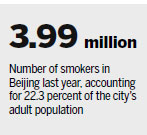Smoking rate on decline in Beijing

Smoking rates in Beijing decreased by 1.1 percentage point after the implementation of tobacco control regulations in the capital, city authorities said on Friday.
The regulation prohibiting smoking in all public spaces, office buildings and public transportation came into effect on June 1, 2015.
A hotline for public complaints was set up the same day.
Fines of up to 200 yuan ($29) could be handed down to smokers caught breaking the regulations, and operators and administrators of public spaces could also be held liable and fined.

The number of smokers in the capital has decreased by 200,000 since the regulations were implemented, said Liu Zejun, deputy director of the Beijing Municipal Health and Family Planning Commission. The city's smoking rate reached 22.3 percent last year with 3.99 million smokers, Liu said.
"The municipal government played a major role in controlling smoking with the cooperation of institutions and departments," Liu said at a news conference on Friday.
An undercover investigation by the municipal commission was conducted from September to November at 1,227 institutions and in 224 taxis throughout the city.
Internet cafes and KTVs were the most problematic, with cigarette use found at nine of the 49 internet cafes inspected.
Cigarette use was also found at 12.9 percent of office buildings and 7.4 percent of hotels.
According to the survey, about 40 percent of taxis investigated didn't have any signs posted about smoking regulations, and passengers were allowed to smoke in almost 21.9 percent of taxis investigated.
Sixty-one hospitals in Beijing have opened smoking cessation clinics, treating 5,340 patients for the first time and providing drug therapies to 2,092.
In 2018, the smoking cessation clinics will be enlarged and standards improved, said Wang Benjin, deputy director of the Beijing Health Inspection Bureau.
All medical staff will be trained this year to provide better smoking cessation services, and the consulting services of the hotline, 12320, will be strengthened, according to the bureau.
"Smoking-control systems combining with social efforts is also necessary," Wang said.
xinwen@chinadaily.com.cn





































